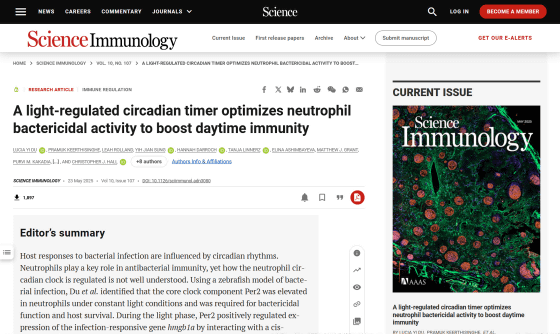Sun exposure may boost your immune system

The idea that
A light-regulated circadian timer optimizes neutrophil bactericidal activity to boost daytime immunity | Science Immunology
https://www.science.org/doi/10.1126/sciimmunol.adn3080

Daylight can boost the immune system's ability to fight infections – new study
https://theconversation.com/daylight-can-boost-the-immune-systems-ability-to-fight-infections-new-study-257224
Most living organisms have physiological phenomena that fluctuate on a roughly 24-hour cycle, known as circadian rhythms . At the molecular level, circadian rhythms are regulated by genetically encoded timekeepers called clock genes , and it is known that various cells contain clock genes.
Circadian rhythms are vital to our biology, but they can easily be disrupted by staying up late or working shifts. Irregular sleep patterns and social jet lag have been linked to weakened immune systems , and research has shown that circadian disruptions caused by shift work negatively impact the body's ability to fight off infections.
These results support the idea that regular exposure to sunlight and maintaining circadian rhythms support a healthy immune system. Hall and his team conducted a new experiment to investigate how circadian rhythms control the immune system.

For their experiments, the research team used
In this study, Hall and his team focused on neutrophils, a type of immune cell that is specialized for bactericidal function among white blood cells. Neutrophils are the most abundant immune cells in the body, but because they are very short-lived, it is difficult to handle neutrophils isolated from human blood in experiments. However, by using transparent zebrafish larvae, it is possible to directly observe the function of neutrophils within the intact body.
The following video is a time-lapse video of an infection model using zebrafish larvae, capturing neutrophils (red fluorescence) ingesting bacteria (green fluorescence) that have invaded the body.
Immune cells attacking bacteria in zebrafish larva - YouTube
Previous research by Hall and his colleagues has shown that the strength of the immune response to bacterial infections is at its highest during the day, when animals are most active. This is thought to be an evolutionary response that gives both humans and zebrafish a survival advantage. 'Diurnal animals, like humans and zebrafish, are most active during the day, so they're more likely to become infected by bacteria,' Hall said.
To investigate how this enhanced immune response is synchronized with sunlight, the researchers first looked at how neutrophils kill bacteria at different times of day, and found that they are more effective at killing bacteria during the day than at night.
The team then genetically edited the neutrophils to see if carefully removing specific clock genes would turn off their circadian rhythms, an approach Hall says is 'like removing a key gear from an analog clock so it stops ticking.'
The results of the experiment revealed that the clock gene ' Per2 ' in neutrophils plays an important role in regulating the circadian rhythm, and that Per2 expression increases under certain light conditions, enhancing the bactericidal function.

'The next challenge is to understand exactly how neutrophils detect light and whether human neutrophils also rely on this internal clock mechanism to control their antibacterial activity,' said Hall. 'It will also be interesting to see whether this bactericidal mechanism is limited to certain types of bacteria, such as those more likely to be encountered during the day, or is it a more general response to all infectious threats (including viral infections)?'
Because neutrophils are the most abundant immune cells recruited to sites of inflammation, these findings have implications for many inflammatory conditions and may lead to the development of new drugs that target the neutrophil circadian clock to modulate the cells' activity.
Related Posts:
in Science, Video, Free Member, Posted by log1h_ik







